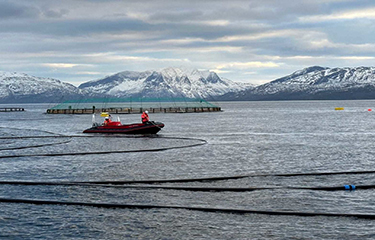Folla Alger and Cermaq recently launched what they said is the world’s first ocean-based combined salmon and kelp farm, where kelp and salmon will both be grown at the same location.
The farm, located in Steigen, Norway, is a sea site designed much like existing salmon farming facilities with 24 cages. However, the middlemost cages of the site are designed with “special solutions” to grow kelp, while the outermost cages will grow salmon, the company said.
Folla Alger and Cermaq formed a partnership in 2022 to launch the pilot project, and collaborate with a research and development group made up of SINTEF Ocean, NTNU, and Nord University. According to a release from Cermaq, the first sea-based site will be done in a collaboration between Folla Alger and Cermaq, while SINTEF Ocean provides the kelp delivery to stock the site at sea.
“Combined operation can provide good area utilization by producing several species within the same area. This area is already set aside for salmon, and by growing kelp on the same site in addition, we hope to be able to contribute to increasing value creation,” SINTEF Ocean Research Manager Silje Forbord said in a release. “This set-up allows us to use the nutrients released by the salmon in a sensible way by producing kelp, which can in turn be used as a raw material in new feed.”
The kelp get access to nutrients produced via waste products from salmon farming, boosting the production. The water-soluble nutrients released from salmon net pens effectively become fertilizer for the kelp, while the kelp serves as a carbon sink.
According to Forbord, the SINTEF Ocean has found that kelp yields are higher when the species is produced alongside fish.
“We know that we can get up to 50 percent better kelp growth by cultivating it together with farmed fish,” Forbord said. “Now we will also look at whether there are more advantages to combined operation.”
As part of the ongoing project, Folla Alger will also be developing alternative feed ingredients utilizing kelp. While kelp has low protein content, it is high in nutrients that could add benefits to traditional salmon feed. Cermaq said the project will serve as a test bed to see if farming kelp alongside salmon helps the fish inside the net pens.
“This is a very exciting project for us, where we can both utilize nutrients from the net pens as a resource, and we can obtain more alternative feed raw materials,” Cermaq Production Director for the Nordland region Truls Hansen said. “It is good circular economy. In addition, the project contributes to increased local value creation and business development, which is very positive for everyone who lives and works here.”
Photo courtesy of Cermaq







